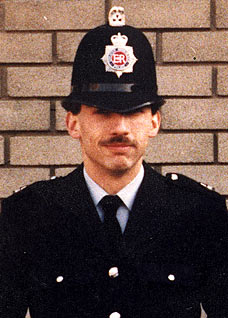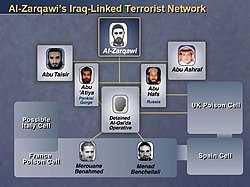
The Terrorism Act 2000 is the first of a number of general Terrorism Acts passed by the Parliament of the United Kingdom. It superseded and repealed the Prevention of Terrorism Act 1989 and the Northern Ireland Act 1996. It also replaced parts of the Criminal Justice Act 1998. The powers it provides the police have been controversial, leading to noted cases of alleged abuse, and to legal challenges in British and European courts. The stop-and-search powers under section 44 of the Act have been ruled illegal by the European Court of Human Rights.

Elizabeth Lydia Manningham-Buller, Baroness Manningham-Buller, is a retired British intelligence officer. She worked as a teacher for three years before joining MI5, the British internal Security Service. She led the newly created Irish counter-terrorism section from 1992 and then became director in charge of surveillance and technical operations. She became Director General of MI5 in October 2002 and, in that capacity, led the Security Service's response to the 7 July 2005 London bombings. Following her retirement in April 2007, she became a crossbench life peer in 2008.

Al-Muhajiroun is a proscribed militant network based in Saudi Arabia. The founder of the group was Omar Bakri Muhammad, a Syrian who previously belonged to Hizb ut-Tahrir; he was not permitted to re-enter Britain after 2005. According to The Times, the organisation has been linked to international terrorism, homophobia, and antisemitism. The group became notorious for its September 2002 conference "The Magnificent 19", praising the September 11, 2001 attacks. The network mutates periodically so as to evade the law; it operates under many different aliases.
Operation Crevice was a raid launched by Metropolitan and local police in England on the morning of 30 March 2004. It was in response to a report indicating cells of terrorists of Pakistani origin operating in the Thames Valley, Sussex, Surrey and Bedfordshire areas, the source of which was said to be an interception of an instruction sent from Al-Qaeda leaders in Pakistan to militants in Britain. In March 2020 Jonathan Evans, Former Director General, MI5 gave an interview and citing one passage: 'The plot itself, however, appeared to be encouraged and fomented by al-Qa`ida in the tribal areas. It was one of the early ones we saw. It involved predominantly British citizens or British residents of Pakistani heritage, something which became something of a theme for this period'. The operation resulted in five men being found guilty in April 2007 of conspiring to cause explosions likely to endanger life.
Mohammed Junaid Babar is a Pakistani American who, after pleading guilty to terrorist related offences in New York, testified in March 2006 against a group of men accused of plotting 21 July 2005 London bombings. In return for being a government supergrass, his sentence was drastically reduced to time served and he was released leading to widespread criticism in Britain.
The 2004 financial buildings plot was a plan led by Dhiren Barot to attack a number of targets in the U.S. and the United Kingdom which is believed to have been approved by al-Qaeda. The evidence against the plotters consisted of home videos, written notes, and files on computers. At the time of the arrests the group had no funding, vehicles, or access to bomb-making equipment.
Mirsad Bektašević, alias Maximus, is a Swedish citizen born in Montenegro, Yugoslavia who in 2005 was arrested in Sarajevo, Bosnia and Herzegovina, charged with planning a terrorist attack against an unnamed target. Bektašević was convicted in 2007 alongside three other men and sentenced to 15 years and 4 months of imprisonment.
The 2007 plot to behead a British Muslim soldier was a plot in Birmingham, England, to kidnap and behead a British Muslim soldier in order to undermine the morale of the British Army and inhibit its recruitment of Muslims. The instigator, Parviz Khan, admitted the plot and was sentenced to life imprisonment, to serve at least 14 years. Another of the accused was found guilty of failing to report the plot and four others were sentenced to up to seven years for supplying equipment to Pakistan-based militants fighting coalition forces in Afghanistan.
Mouloud "the dude" Sihali was a suspect in the Wood Green ricin plot. He arrived as an illegal immigrant in the UK in 1997, having left Algeria to avoid national service. He was arrested on 19 Sep 2002 on suspicion of having the intent to poison as part of a terror attack in the UK, and was charged on 22 January 2003. No evidence of production of the poison ricin was presented at the trial, which opened in September 2004 at the Old Bailey, convicted primarily by Judge Mark Jewell. Sihali was acquitted of the charges in April 2005, but was re-arrested on 15 September 2005, and held as a terrorist suspect. He is now awaiting extradition to Algeria. There is concern that he could be arrested and tortured if deported to Algeria.

The international activities of Al-Qaeda includes involvements in Europe, where members of the group have been involved in militant and terrorist activities in several countries. Al-Qaeda has been responsible for or involved in attacks in Western Europe and Russia, including the 2004 Madrid train bombings, 2010 Moscow Metro bombings, 2011 Domodedovo International Airport bombing, and the January 2015 Île-de-France attacks.

The 2006 transatlantic aircraft plot was a terrorist plot to detonate liquid explosives, carried aboard airliners travelling from the United Kingdom to the United States and Canada, disguised as soft drinks. The plot was discovered by British Metropolitan police during an extensive surveillance operation. As a result of the plot, unprecedented security measures were initially implemented at airports. The measures were gradually relaxed during the following weeks, but passengers are still not allowed to carry liquid containers larger than 100 ml onto commercial aircraft in their hand luggage in the UK and most other countries, as of 2023.

Ian Davison is an English white supremacist and neo-Nazi who was arrested in 2009 for planning terrorist attacks. Davison's son Nicky, a milkman's assistant, then 18 years old, was arrested at the same time.

The Pankisi Gorge crisis was a spillover of the Second Chechen War, with military dimension in Georgia early in the 2000s. Georgia was pressured by Russia and the United States to repress the threats of Al-Qaeda in the Pankisi Gorge.

DC Stephen Robin Oake, was a police officer serving as an anti-terrorism detective with Greater Manchester Police in the United Kingdom who was murdered while attempting to arrest a suspected terrorist in Manchester on 14 January 2003.
Events from 2004 in England

Islamic terrorism in Europe has been carried out by the Islamic State (ISIL) or Al-Qaeda as well as Islamist lone wolves since the late 20th century. Europol, which releases the annual EU Terrorism Situation and Trend report (TE-SAT), used the term "Islamist terrorism" in the years 2006–2010, "religiously inspired terrorism" 2011–2014, and has used "jihadist terrorism" since 2015. Europol defines jihadism as "a violent ideology exploiting traditional Islamic concepts".

On 15 September 2017, at around 08:20 BST, an explosion occurred on a District line train at Parsons Green Underground station, in London, England. Thirty people were treated in hospital or an urgent care centre, mostly for burn injuries, by a botched, crude "bucket bomb" with a timer containing the explosive chemical TATP. Police arrested the main suspect, 18-year-old Iraqi asylum seeker Ahmed Hassan, in a departure area of the Port of Dover the next day, and subsequently raided several addresses, including the foster home of an elderly couple in Sunbury-on-Thames where Hassan lived following his arrival in the United Kingdom two years earlier claiming to be an asylum seeker.
The 2018 Cologne terrorist plot was foiled when, on 13 June 2018, police arrested Sief Allah H. in Cologne as he was manufacturing an explosive device which incorporated the highly toxic substance ricin. He was arrested for having breached the Kriegswaffenkontrollgesetz.










